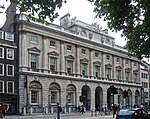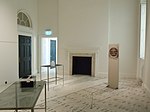Tower Lifeboat Station
City of WestminsterInfrastructure in LondonLifeboat stations in LondonLondon River ServicesPiers in London ... and 2 more
Use British English from September 2017Victoria Embankment

The Tower Lifeboat Station is a lifeboat station on the River Thames in London, UK, operated by the Royal National Lifeboat Institution (RNLI). It is located at Victoria Embankment on the North Bank of the Thames, next to Waterloo Bridge. The pier takes its name from the original RNLI lifeboat station which opened in 2002 further downstream at Tower Pier, next to the Tower of London. In 2006 the lifeboat station moved to its present location at Waterloo Pier, formerly known as the Waterloo Police Pier.
Excerpt from the Wikipedia article Tower Lifeboat Station (License: CC BY-SA 3.0, Authors, Images).Tower Lifeboat Station
Victoria Embankment, London Covent Garden
Geographical coordinates (GPS) Address External links Nearby Places Show on map
Geographical coordinates (GPS)
| Latitude | Longitude |
|---|---|
| N 51.50993 ° | E -0.117412 ° |
Address
Tower Lifeboat Station
Victoria Embankment
WC2R 2PP London, Covent Garden
England, United Kingdom
Open on Google Maps









